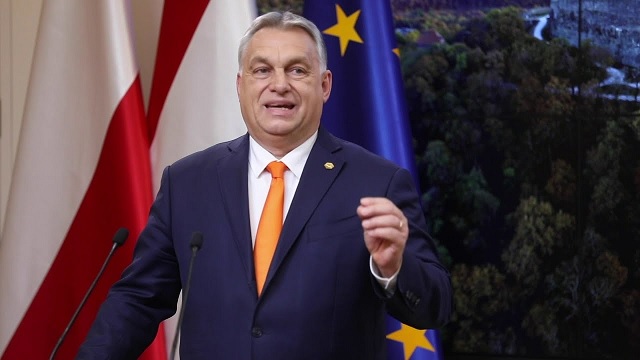
COMMENT | ANA PALACIO | It has been an eventful year, to put it mildly. In fact, the world has endured so much war, disruption, tension, and uncertainty that we are left to wonder whether the rules-based global order, which has guided international relations since World War II, will survive for much longer.
The post-war international order is not perfect, not least because it remains dominated by its leaders and architects: Europe and, especially, the United States. But one should not underestimate the value of a global system that both rests on and perpetuates liberal values, particularly the rule of law. And that system now appears to be in danger, as these values are attacked, undermined, and eroded.
According to the United Nations, the rule of law demands that every person, institution, and entity, “including the state itself,” is accountable to laws that are “publicly promulgated, equally enforced,” “independently adjudicated,” and “consistent with international human-rights norms and standards.” But three main forces are increasingly preventing this standard from being met.
The first is rising authoritarianism. According to Freedom House, 73 countries’ Freedom in the World scores declined in 2020, while just 28 countries’ scores improved. This is hardly an anomalous development: countries with declining scores have outnumbered those with rising scores every year since 2005. And the erosion is evident worldwide, from Africa to Latin America to Southeast Asia.
Even the European Union is not immune. Look no further than Hungarian Prime Minister Viktor Orbán’s regime. After taking power in 2010 (for the second time), Orbán proceeded to weaken the judiciary – including by narrowing the constitutional court’s jurisdiction and politicizing the selection of judges – and redrawing legislative districts to ensure the dominance of his Fidesz party.
Orbán made no secret of his intentions, proclaiming in 2014 that he was building an “illiberal state” in Europe. Four years later, in 2018, the European Parliament triggered Article 7 proceedings against Hungary – which could lead to the suspension of some of a member state’s rights – over the alleged risk of violations of the EU’s founding values. While Hungary has since pursued corrective judicial reforms in order to unlock EU funds, it has a long way to go to reverse its descent into illiberalism.
But Orbán is not alone. After taking power in 2015, Poland’s right-wing Law and Justice (PiS) party similarly introduced sweeping reforms aimed at weakening the judiciary, including by eroding the Constitutional Tribunal’s independence. (That Tribunal subsequently ruled that Polish law took precedence over EU law.) This led the European Commission to initiate Article 7 proceedings against Poland in 2017, alleging that there is a “clear risk of a serious breach” of the rule of law.
The good news is that Polish voters recently voted PiS out of power. The bad news is that Orbán remains popular in Hungary.
Spain, too, is now flirting with “illiberalism.” Last month, Spanish Prime Minister Pedro Sánchez reached an agreement with the Catalonian independence party (Junts) to extend amnesty to Catalan separatists – a move he had previously called unconstitutional – in exchange for political support to keep his socialists in power. As part of the deal, parliamentary inquiry commissions will be created to supervise judges’ application of the amnesty law. Though this is supposedly intended to protect against so-called lawfare, it would be a clear breach of the separation of powers.
The second major force undermining the rule of law globally is theocracy. Most of the world’s 49 Muslim-majority countries have embedded references to Sharia – a body of religious law based on Islamic scripture – in their legal frameworks, with many prohibiting the introduction of laws that are inconsistent with Sharia.
But Sharia contradicts some of the basic rights enshrined in Western systems, from freedom of religion to non-discrimination on the basis of sex. More to the point, it does not regard all people as equal before the law. Women and men are regarded differently, as are believers and non-believers.
The independent adjudication of laws is inherently incompatible with a system in which there is no separation between the judiciary and political and religious authorities. And the view of Sharia as divinely revealed means that it cannot be adapted to evolving standards regarding, say, human rights. Given all this, countries that embed Sharia in their national legal frameworks are necessarily limited in their ability to adhere to – and apply – the rule of law.
The third factor undermining the rule of law is distinctly Western: polarization. A prime example is the US, where the constitutional right to free speech is under increasing pressure, as certain hot-button issues – such as climate change or immigration – have been imbued with a moralistic Manichean quality that renders meaningful debate impossible.
Of the core principles that have underpinned the international order for the last 75 years, the rule of law stands out as particularly important. There can be no democracy, human rights, or international cooperation without it. If we allow it to deteriorate further – not only in younger and weaker democracies but also in countries with deeply embedded liberal traditions – the malaise of the post-war international order will surely deepen.
****
****

Ana Palacio, a former foreign minister of Spain and former senior vice president and general counsel of the World Bank Group, is a visiting lecturer at Georgetown University.
Copyright: Project Syndicate, 2023.
 The Independent Uganda: You get the Truth we Pay the Price
The Independent Uganda: You get the Truth we Pay the Price


